When it comes to creating a welcoming outdoor space for relaxation, entertainment, and leisure, a well-constructed deck is the epitome of perfection.
In Tennessee, a state blessed with diverse landscapes and varying climates, choosing the right decking material is crucial to ensure its longevity and aesthetic appeal. With so many options available in the market, making an informed decision can be overwhelming.
In this blog post, we will explore the six most popular decking materials in Tennessee, highlighting their unique features, benefits, and drawbacks.
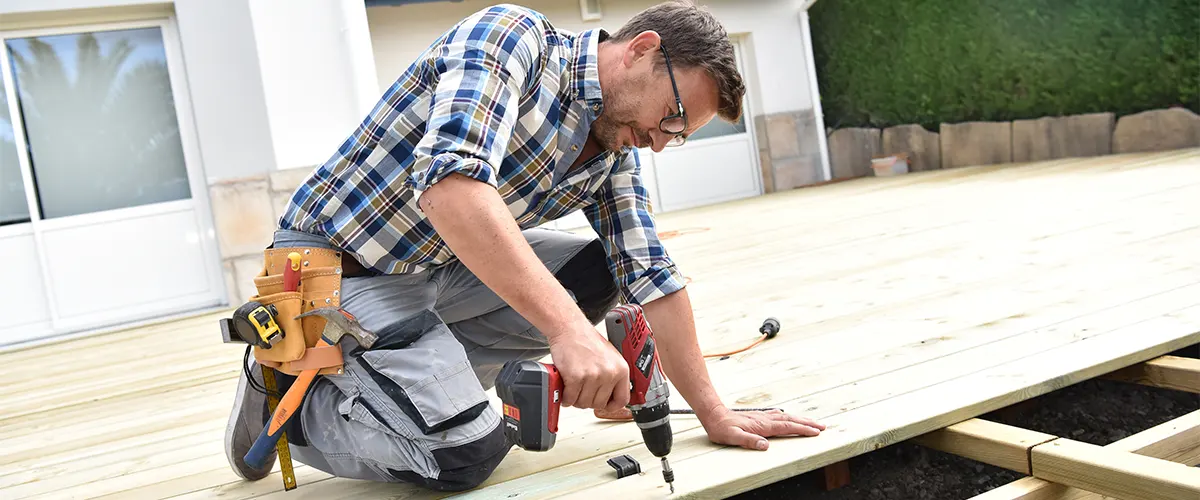
Pressure-Treated Wood
Pressure-treated wood is a classic and cost-effective choice for decking in Tennessee.
This material is renowned for its durability and ability to withstand harsh weather conditions, which is especially important in a state where summers can be hot and humid while winters can be cold and wet.
The wood is chemically treated to resist rot, decay, and insect infestations, making it an excellent long-term investment.
| Pros | Cons |
|---|---|
| Pressure-treated wood is one of the most budget-friendly options for decking materials, making it accessible to a wide range of homeowners. | This type of wood requires regular staining and sealing to prevent weathering, fading, and splintering, adding to the ongoing maintenance costs. |
| The warm, natural look of wood adds a classic and inviting charm to any outdoor space, complementing various architectural styles. | The chemical treatment used to make pressure-treated wood resistant to decay and insects raises environmental concerns due to potential leaching of chemicals into the soil. |
| Pressure-treated wood is easily available at local hardware stores and lumberyards, making it convenient to purchase and install. | While pressure-treated wood is relatively durable, it may not be as long-lasting as some alternative decking materials like tropical hardwoods or composites. |
Composite Decking
Composite decking is gaining immense popularity in Tennessee for its low maintenance and eco-friendly nature.
Made from a combination of recycled wood fibers and plastic, composite decks mimic the appearance of natural wood while eliminating its drawbacks. It resists fading, staining, and mold growth, making it ideal for Tennessee’s humid climate.
| Pros | Cons |
|---|---|
| One of the most significant advantages of composite decking is its low maintenance requirements. It does not require staining, sealing, or painting, saving time and money on upkeep. | The initial cost of composite decking can be higher than traditional pressure-treated wood, which may deter some budget-conscious homeowners. |
| Composite decking materials are highly resistant to rot, warping, and insect damage, providing a longer lifespan compared to natural wood. | In hot and sunny climates like Tennessee, some composite decks may retain heat, making them uncomfortable to walk on barefoot during peak summer months. |
| Many composite decking brands use a blend of recycled wood fibers and plastic, making it an environmentally conscious choice that reduces the demand for virgin wood and plastic materials. | While composite decking is generally stain-resistant, some spills or accidents may leave stubborn marks that require extra cleaning efforts. |
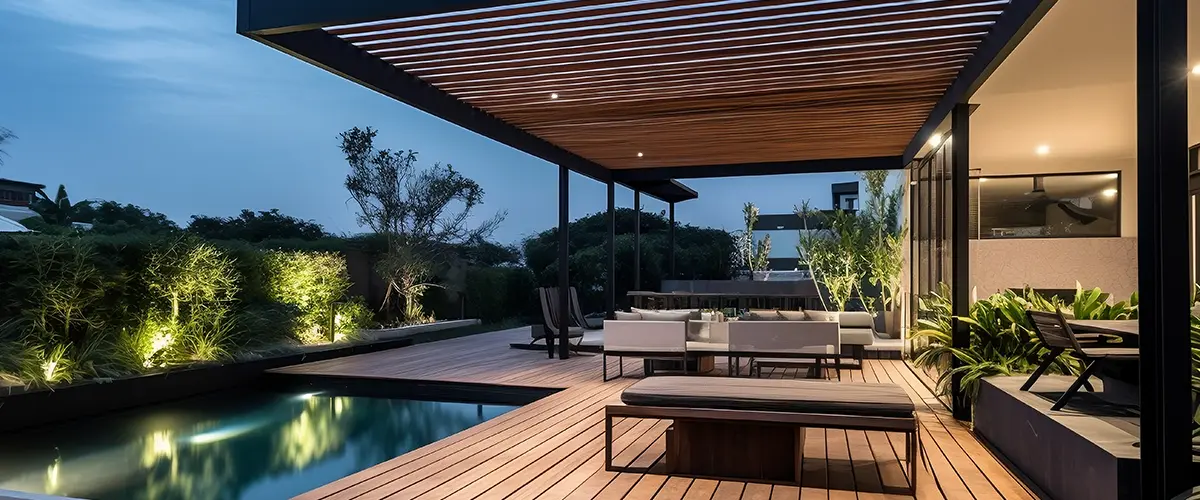
Tropical Hardwoods
For homeowners seeking exotic elegance and unparalleled durability, tropical hardwoods are an excellent choice for decking in Tennessee.
Species like Ipe, Cumaru, and Tigerwood boast remarkable resistance to decay, insects, and extreme weather conditions. These dense and richly colored woods are perfect for those who appreciate the allure of natural, unique grains.
| Pros | Cons |
|---|---|
| Tropical hardwoods like Ipe and Cumaru are renowned for their exceptional durability, with some decks lasting up to 50 years or more with proper maintenance. | Tropical hardwoods are among the most expensive decking materials, making them a considerable investment for homeowners. |
| These dense woods boast distinctive grains and rich colors, adding an air of luxury and elegance to outdoor spaces. | Due to their density, installing tropical hardwoods can be more challenging and time-consuming, often requiring specialized tools and expertise. |
| Tropical hardwoods contain natural oils and dense fibers that make them highly resistant to rot, decay, insects, and harsh weather conditions. | The popularity of tropical hardwoods has raised concerns about deforestation and the impact on tropical ecosystems, leading to a push for responsibly sourced options. |
Cedar Decking
| Pros | Cons |
|---|---|
| Cedar contains natural oils that act as a deterrent to insects and decay, making it more resistant to damage caused by pests and moisture. | Cedar requires regular maintenance in the form of staining and sealing to protect it from weathering, color fading, and to ensure its longevity. |
| Cedar's warm and attractive appearance, along with its natural aroma, adds a rustic and charming ambiance to any outdoor space. | While cedar is relatively durable, it may not be as long-lasting as some other decking materials, such as tropical hardwoods or vinyl. |
| Cedar is a renewable resource, and when sourced responsibly, it can be an eco-friendly choice for decking, appealing to environmentally conscious homeowners. | Compared to pressure-treated wood, cedar decking can be more expensive, and its cost may vary based on availability and location. |
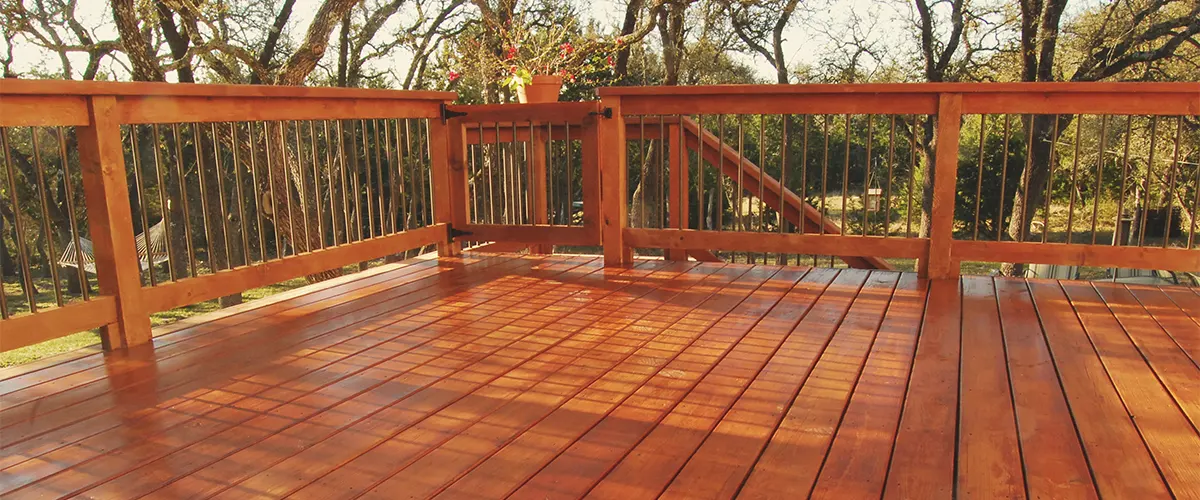
Vinyl Decking
| Pros | Cons |
|---|---|
| Vinyl decking is virtually maintenance-free, as it does not require staining, sealing, or painting. A simple cleaning with soap and water is usually sufficient to keep it looking good. | While vinyl decking comes in a variety of colors and styles, it may lack the natural appeal and texture of wood or the exotic look of tropical hardwoods. |
| Vinyl is naturally water-resistant, making it an ideal choice for areas near pools, hot tubs, or in regions with high rainfall like Tennessee. | Vinyl decks can become warm in direct sunlight, making them less comfortable to walk on during hot summer days. |
| Vinyl decking materials are known for their durability and resistance to rot, mold, and insects, ensuring a long-lasting outdoor space. | Vinyl decking is made from PVC, which is derived from non-renewable fossil fuels. The production and disposal of PVC can have environmental impacts. |
Aluminum Decking
| Pros | Cons |
|---|---|
| Aluminum is highly resistant to rust, corrosion, and insect damage, ensuring a long-lasting and low-maintenance deck. | Aluminum decking can be one of the more expensive options upfront, which may deter some budget-conscious homeowners. |
| Aluminum is significantly lighter than other materials like wood or concrete, making it an excellent choice for elevated decks or structures with weight restrictions. | Aluminum can produce a louder sound underfoot compared to softer materials like wood or composite, which might not be preferable for some people. |
| Aluminum decking provides a sleek and contemporary look, appealing to homeowners seeking a modern outdoor design. | While aluminum decking comes in various colors, the options may be more limited compared to composite or vinyl decking. |
Choosing the Best Decking Materials for Tennessee
If you’re a homeowner in Tennessee looking to build or upgrade your deck, selecting the right decking material is essential to ensure your outdoor space withstands the region’s diverse weather conditions and provides lasting enjoyment.
Climate and Weather Resistance
Tennessee experiences a range of weather conditions, from hot and humid summers to cold and wet winters.
When selecting decking materials, prioritize those that can withstand the local climate. Materials with good weather resistance, such as composite decking and tropical hardwoods, are ideal choices.
Composite decking resists fading, staining, and mold growth, making it well-suited for Tennessee’s humid climate. Tropical hardwoods, like Ipe and Cumaru, are naturally durable and can handle temperature fluctuations and humidity.
Maintenance Requirements
Consider how much time and effort you’re willing to invest in maintaining your deck. Different materials have varying maintenance needs.
For low-maintenance options, vinyl and composite decking are excellent choices. Vinyl decking requires minimal upkeep, with simple cleaning being sufficient.
Composite decking does not require staining or sealing and only needs occasional cleaning. On the other hand, natural wood materials like cedar and pressure-treated wood require regular staining and sealing to protect against weathering and insect damage.
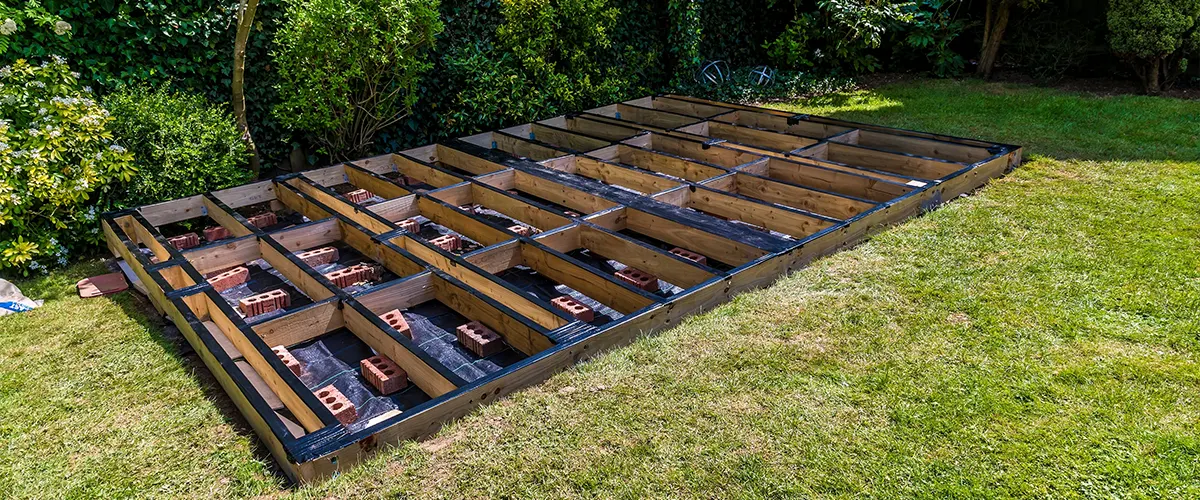
Budget and Long-Term Investment
Your budget will play a crucial role in determining the type of decking material you choose. Pressure-treated wood is the most budget-friendly option, but keep in mind the long-term costs associated with maintenance.
Composite decking, while more expensive upfront, may save you money in the long run due to its low maintenance requirements. Tropical hardwoods offer durability and elegance but come with a higher initial cost.
Aesthetic Appeal and Style
Consider the overall aesthetic you want to achieve with your deck. Each decking material has its own unique appearance. If you prefer a natural, rustic look, cedar decking may be the perfect choice.
For a modern and sleek style, aluminum or composite decking could be more suitable. Tropical hardwoods exude luxury and elegance, offering an exotic and eye-catching appeal.
Materials For Finishing The Deck
If you’re building a wood deck you’ll need to treat the wood decking materials against the elements. While hardwoods require less maintenance and repairs, softwood deck boards like cedar and redwood decking (two popular choices for decking) will need a lot of care.
To finish up your deck and boost both its aesthetics and durability, you’ll need to stain and seal it.
Remember that before applying stain or any sealant, your deck needs to completely dry. When your new deck is ready, wait about two weeks to treat it with stain and sealant.
Let's see what you need to get started
- Paintbrush: For applying stain to hard-to-reach places like deck railings or between boards, a bristle brush or foam brush are excellent tools.
- Paint roller: To save time, you can use a paint roller to apply an even coat over larger areas on your deck. Use a paint dish and push the roller against it a few times to get rid of the excess stain and avoid drips all over.
- Painter’s tape and drop cloths: If you bought a solid stain with a bold or bright color, you'll have to protect the areas around your deck with either painter's tape or drop cloths. If you have a patio beneath your deck, you should place drop cloths on the patio to avoid staining it.
- Sprayer: A paint sprayer will save you a lot of time, but there are high chances that you'll overspray and create uneven coats of stain. If you prefer using a sprayer, make sure that you cover nearby surfaces and plants with a plastic sheeting.
Note: Composite deck building materials like Trex, TimberTech, or Fiberon requires little to no maintenance at all. It’s a manufactured decking material that offers higher strength and durability than wood, and it’s the top choice for homeowners tired of keeping up with the maintenance of their decks.
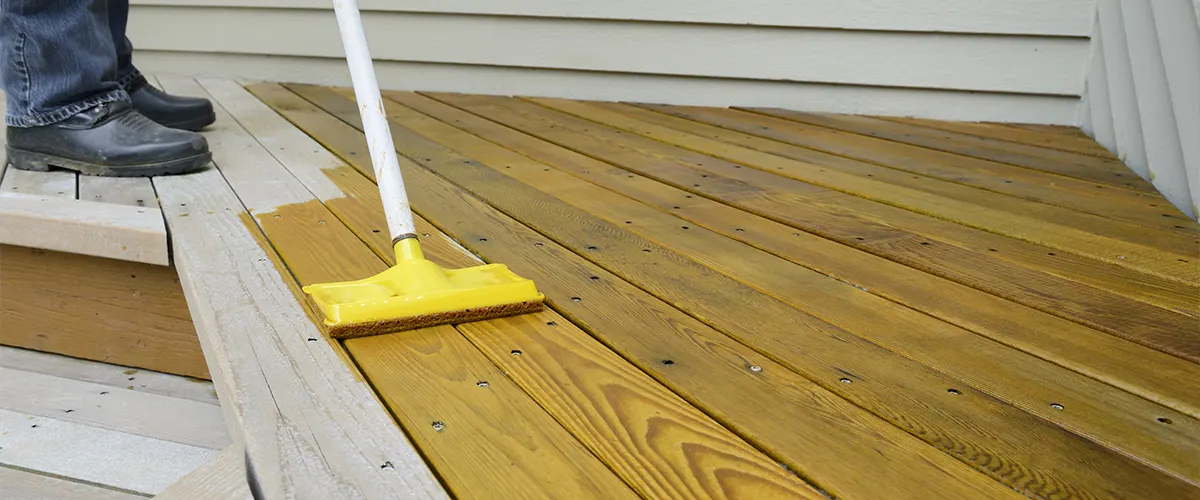
FAQs - Best Decking Materials in Tennessee
Conclusion
Choosing the right decking material for your Tennessee home is a decision that can significantly impact your outdoor living experience.
Whether you prefer the classic charm of wood, the low-maintenance benefits of composite or vinyl, or the elegance of tropical hardwoods, there is a decking material to suit your style, budget, and practical needs.
Call us today at (865) 801-4545 and let’s discuss your upcoming deck building project, or get in touch with us by requesting a quote!
